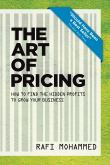Whip Deflation Now
Reprinted from the Harvard Business Review website.
It's becoming apparent that the US economy is headed towards deflation, unless we work together to avert it. That might be difficult, however, because the majority of the public simply doesn't understand what deflation is, how it affects the economy and businesses, and what can be done about it.
Let's begin with the definition. Quite simply, deflation is an economic environment characterized by a steady decline of product and service prices. Hearing that, the typical reaction might be, "So what's the problem?" Low prices allow consumers to purchase more with their income. Even for businesses, being a low-cost leader is a common strategy that can pay off well. Wal-Mart now tops the Fortune 500 list thanks to its consumer-friendly promise of "Save Money, Live Better."
The problem arises when too much of this "good thing" occurs. When companies are drawn into a crocodile-like death spiral of continuous discounting, it becomes terrifically hard to claw out of a recession.
Deflation gets its start when a recessionary economy causes consumers to pull back and scrutinize their purchases. In a demand-challenged environment, it is understandable for companies to offer "keep the lights on" discounts while fully intending to raise prices when times get better. The problem is that, given the combination of a slack economy, price-sensitive customers, aggressive discounting by rivals, and the inescapable equation that Price - Cost = Profit, the handiest ways for companies to improve profits are cutting wages, laying off workers, and/or squeezing supplier margins. Such cost-cutting actions result in even less money in the pockets of consumers, which results in fewer purchases and of course makes them more interested in discounts. You can see how this self-feeding cycle leads to an economic environment characterized by waves of discounting and falling consumer incomes.
The key takeaway here is this: Discounting turns "bad" at the tipping point where cost cutting reduces consumer income. Since consumer spending accounts for 70% of our economy, rampant discounting in a weak market environment can actually precipitate a recession.
Are we at that dangerous point yet? Unfortunately, a number of signs suggest that the US economy is teetering on the brink of a deflationary downward pricing spiral:
- In spite of rising costs, companies are finding it difficult to raise prices because end-consumers remain price sensitive.
- Companies are cost-cutting to boost profits. Harley Davidson, for instance, has faced three years of declining consumer demand. That said, the motorcycle manufacturer recently reported Q2/10 profits of $71 million, which is more than triple what it reported for Q2/09. Low demand and high profits ... Where are the profits coming from? Job cuts. Last year, Harley Davidson cut 2,000 jobs (more than 20% of its workforce), and it plans to shed another 1,400-1,600 employees by the end of 2011. Similarly, with revenues down by $20 billion since 2005, Ford North America is expected to earn $5 billion this year (compared to a $1.6 billion loss last year). Again, layoffs are the key to profitability: Ford has cut its North American workforce by close to 50% in the last five years.
- Consumer confidence is dropping. The recent July 2010 University of Michigan poll noted the lowest level of consumer confidence since November 2009.
- Big investors are shifting their portfolios to favor interest-bearing investments such as bonds and dividend paying stocks.
- Last week James Bullard, president of the Federal Reserve Bank of St. Louis, expressed concern about the U.S. entering a period of "Japanese-style" deflation and slow growth.
The U.S. ought to be concerned about deflation, don't you think?
With enough foresight, it's possible to nip it in the bud. Deflation can be avoided, and economic recovery accelerated, if we act according to these four imperatives:
- Don't be fooled by the Dow. A 10,000+ Dow Jones Index brings an "it's not as bad as it was" sense of relief to many of us. Profits are good, but less so if they come at the expense of consumer income.
- Continue the economic recovery full-court press. The key to preventing a deflation-induced recession is to stimulate the economy.
- Keep taxes low. While reducing the deficit is important, averting our economy from a recession takes precedent. Low taxes enable consumers to spend more and helps small businesses justify the risk of investing in future growth.
- Reduce loan risk aversion. While financial reform was necessary, the pendulum has swung to the opposite extreme, resulting in constriction of small business loans. Federal Reserve Board Chief Ben Bernanke recently expressed concern that small businesses "have had difficulty obtaining the credit that they need to expand and, in some cases, even to continue operating." Policy-makers need to focus on loosening credit to businesses.
Deflation is no bargain; in an already challenged U.S. economy, it should be a high priority concern for public policy makers, businesses, investors, and consumers. We've seen the early warnings. Let's not choose to ignore them.




